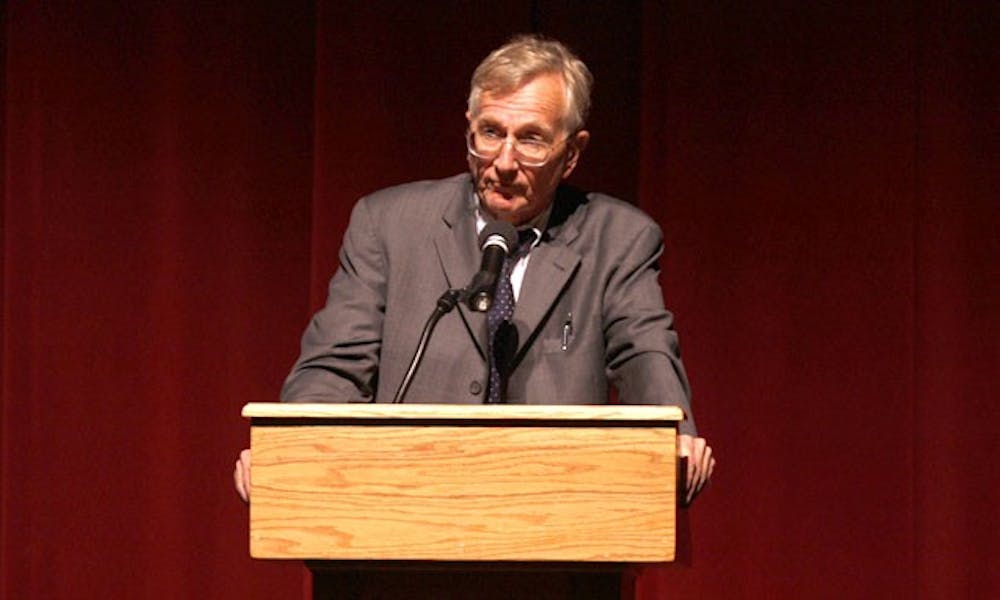As Duke students stress over their own midterm grades, Pulitzer Prize-winning investigative journalist and author Seymour Hersh issued a report card of his own in Page Auditorium Tuesday night.
Although a loosely structured lecture that covered a variety of topics, “A Report Card on Obama’s Foreign Policy” was Hersh’s discussion of President Barack Obama’s progress and the obstacles the president will face in the coming years of his term.
“It’s easy for me to stand here and pick on him—it’s tougher to actually do it,” Hersh said.
Hersh is the kickoff speaker in the Provost’s Lecture Series titled “The Future of the Past, The Future of the Present: The Historical Record in the Digital Age.” The Washington, D.C.-based reporter currently writes for The New Yorker but is most famous for uncovering the My Lai massacre during the Vietnam War and the U.S. military’s abuse of prisoners at Abu Ghraib in Baghdad.
Hersh lauded Obama for changing the United States’ position on Iran, deeming his work an “A+,” and for his assertive and direct approach to dealing with Russia.
Hersh remarked that the more problematic aspects of Obama’s foreign policy remain Iraq and a looming civil war that he predicted will break by 2010 as well as al Qaeda’s infiltration into Pakistan and the Turkish threat, if and when northern Iraq secedes. Hersh also said the view of America’s fallen image, a result of the administration of former President George W. Bush and former Vice President Dick Cheney, will be difficult to rectify.
“Cheney-Bush are going to haunt us for the rest of our lives,” Hersh said, “We are in real trouble around the world, and Obama can’t fix that.”
Hersh also said Obama must start leading more assertively, citing the health care issue as an example. Hersh stressed the need for the president to take advantage of his political capital, adding that Obama should not dismiss the blessing of such a favorable majority in Congress.
“He’s just going to have to take charge,” Hersh said. “He’s frozen, and I don’t know why he’s frozen.”
He noted, however, that Obama’s toughest challenges are the result of infighting between the Pentagon and the White House. Hersh said racism and accusations of socialism, as well as continued military support for a neo-conservative philosophy, have hindered the Obama administration.
“A lot of people in the Pentagon would be happy to see [Obama] get into trouble,” Hersh said. “He can either let the Pentagon run him, or he can begin to run the Pentagon.”
The last time Hersh spoke at Duke was before 9/11, in October 2000, on the ethics of journalism.
Provost Peter Lange said Hersh’s work is a valuable asset to not only journalism, but history as well.
“Mr. Hersh educates and challenges us with his writing, and his ability to access and confirm primary sources is an incredible contribution to the historical record of this digital age,” Lange said.
For the last 30 minutes of his lecture, Hersh opened the floor for questions. As audience members asked about Obama’s foreign policy on Iraq and Pakistan, Hersh continued to emphasize the need for Obama to take decisive action, as well as the need for Americans to be patient.
“He was really dealt a bad hand by [Bush]—Obama hasn’t got a case yet,” Hersh said. “I’m going to give him a year, and then let’s see where he is.”
Sophomore Chelsea Canepa was a member of the audience. She said she found the topic of Hersh’s discussion to be particularly illuminating.
“It was interesting, the interplay and the pressure between the military and the White House, especially when [Hersh] called Obama ‘boxed-in [by the armed forces],’” Canepa said.
Get The Chronicle straight to your inbox
Signup for our weekly newsletter. Cancel at any time.

